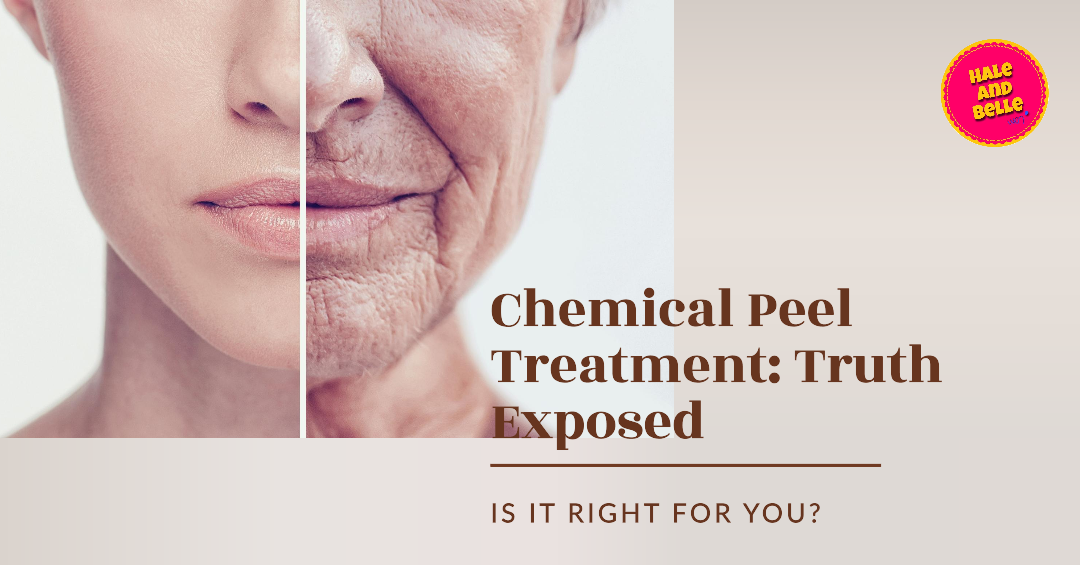The Chemical peel treatment has become increasingly popular in recent years, promising to rejuvenate the skin and address various concerns such as acne scars, wrinkles, and hyperpigmentation. While many people tout their effectiveness, there are aspects of chemical peels that aren’t always discussed openly. In this article, we’ll uncover the truth about chemical peel treatments, including their benefits, risks, and what to expect.
In This Article
- 1 The Basics of Chemical Peel Treatment
- 2 What Can Chemical Peels Treat?
- 3 The Not-So-Pretty Side
- 4 Choosing the Right Treatment: What You Need to Know
- 5 Is a Chemical Peel Treatment Right for You?
- 6 Chemical Peel Treatment in India
- 7 The Takeaway: Informed Decision-Making
- 8 Share with your friends:
- 9 Like this:
- 10 Related
The Basics of Chemical Peel Treatment
Chemical peels involve the application of specialized solutions to the skin, which exfoliate the outermost layers, revealing smoother, healthier skin underneath. This process stimulates collagen production and promotes cell turnover, resulting in improved texture, tone, and overall appearance.
What Can Chemical Peels Treat?
Proponents of chemical peel treatments often highlight their numerous benefits, including:
- Fine Lines and Wrinkles: Chemical peels can effectively rejuvenate the skin, reducing the appearance of fine lines, wrinkles, and age spots.
- Acne Treatment: They can help improve acne-prone skin by unclogging pores, reducing inflammation, and minimizing acne scars.
- Hyperpigmentation Correction: Chemical peels can lighten dark spots, sun damage, and uneven skin tone, resulting in a more even complexion.
- Fine lines and wrinkles:Smoothing texture and reducing the appearance of fine lines.
- Overall skin texture:Improving tone and texture.
The Not-So-Pretty Side
While chemical peels can offer significant benefits, they also come with potential risks and side effects, including:
- Downtime:Depending on the peel strength, expect redness, peeling, and sensitivity that can last for several days to weeks.
- Skin Irritation and Sensitivity: Following a chemical peel, the skin may experience redness, irritation, and increased sensitivity to sunlight.
- Prolonged Healing Time: Deeper chemical peels may require a longer recovery period, during which the skin may peel, flake, or become temporarily discolored.
- Risk of Complications: In rare cases, chemical peels can lead to scarring, infection, or changes in skin pigmentation, particularly if not performed by a qualified professional.
- Sun Sensitivity: After a chemical peel, the skin is more susceptible to sun damage. Sun protection is essential to prevent further skin damage and maintain results.
- Not a one-size-fits-all:Peels may not be suitable for everyone, especially those with sensitive skin or certain medical conditions.
Choosing the Right Treatment: What You Need to Know
When considering chemical peel treatment, it’s essential to:
- Consult a Qualified Professional: Seek treatment from a board-certified dermatologist or licensed skincare professional with experience in chemical peels.
- Understand Your Skin Type: Not all chemical peels are suitable for every skin type. Your provider will assess your skin’s needs and recommend the most appropriate treatment.
- Discuss Expectations and Concerns: Have an open and honest conversation with your provider about your skincare goals, any medical conditions, and potential risks.
Is a Chemical Peel Treatment Right for You?
The answer depends on your skin concerns, skin type, and overall health. It’s crucial to consult with a dermatologist or qualified skincare professional. They will assess your skin, discuss realistic expectations, and recommend the best type of peel (or alternative treatment) for your needs.
Chemical Peel Treatment in India
Here are some reputable clinics in India offering chemical peel treatments. It’s important to note that the cost will vary depending on the depth of the peel, the clinic’s location, and the expertise of the dermatologist.
Top-Rated Clinics:
- Kaya Skin Clinic: A well-established, pan-India chain known for its skin treatments, including chemical peels. They offer a variety of peel options to address different concerns.
- Website: https://www.kaya.in/
- Oliva Skin & Hair Clinic: Another popular chain with branches in multiple cities. They have a good reputation for their chemical peel procedures.
- Website: https://shop.olivaclinic.com/
- SkinLab: Specializes in a wide range of aesthetic and skin treatments, including various chemical peel options.
- Website: https://www.skinlab.in/
- Sakhiya Skin Clinic: A well-regarded clinic offering various chemical peels, often with a focus on pigmentation treatments.
- Website: https://www.sakhiyaskinclinic.com/
Important Considerations
- Consultation:Before booking a chemical peel, always schedule a consultation with a dermatologist at the clinic. They will assess your skin type, concerns, and recommend the best type of peel for you.
- Expertise:Choose a clinic where the dermatologists are experienced in performing chemical peels.
- Aftercare:Ensure the clinic provides clear aftercare instructions and support. Chemical peels make your skin sensitive, and proper aftercare is essential.
The Takeaway: Informed Decision-Making
While chemical peel treatments can yield remarkable results, it’s crucial to approach them with caution and realistic expectations. By understanding the benefits, risks, and proper aftercare, individuals can make informed decisions about whether chemical peels are right for them.
Before undergoing treatment, do your research, consult with a qualified professional, and weigh the pros and cons carefully. Remember, the truth about chemical peel treatments lies in knowing both their potential benefits and the risks they entail.
Disclaimer: The information provided in this article is intended for general informational purposes only and should not be construed as medical advice. It is important to consult with a qualified healthcare professional, such as a dermatologist or licensed aesthetician, to determine if a chemical peel is the right treatment for you and to discuss the potential risks and benefits involved. This article does not address all potential side effects or complications associated with chemical peels. Individual results may vary, and it is crucial to follow all pre- and post-treatment instructions carefully to minimize risks and optimize outcomes. Please note that the information in this article is not a substitute for professional medical advice, diagnosis, or treatment. Always seek the advice of your physician or other qualified healthcare provider with any questions you may have regarding a medical condition.











